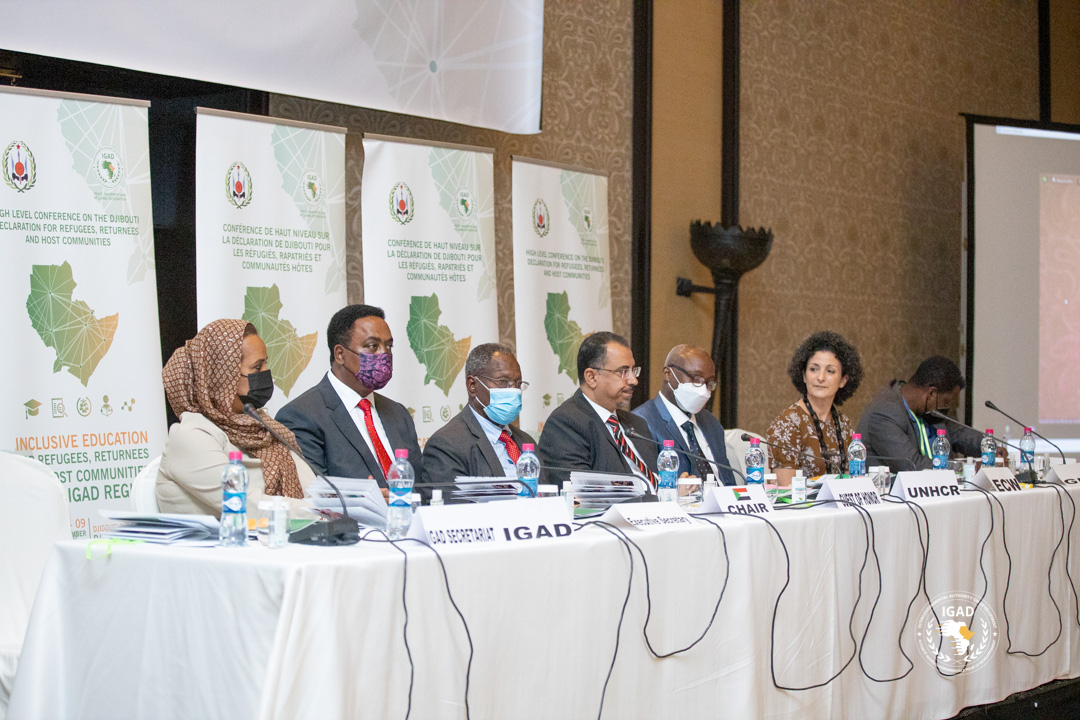Your Excellencies;
- The Permanent Secretary, Ministry of Education Republic of Djibouti
- Distinguished representatives of IGAD Member States
- Ambassador Michael Haeusler representing the Federal Republic ofGermany
- Ambassador Aidan O’Hara, Head of the European Union Delegation inDjibouti
- Representatives of IGAD Partner Agencies in this endeavor, EducationCannot Wait, GIZ, UNHCR, UNESCO
- My fellow members of the IGAD Secretariat
- Ladies and Gentlemen, all protocols observedIt gives me great pleasure to welcome you all to this high-level conference on the very important issue of building and safeguarding the intellectual resources of the most vulnerable sections of our population in this region.
Right from the outset, allow me to first of all express my sincerest appreciation to the Government and People of Djibouti for not only hosting us, but also demonstrating able and inspiring leadership and initiative with regard to the right of education for refugees and support to host communities.
This is a historic event for 3 main reasons.
- First, we are holding the Conference, 4 years after the first high- level regional gathering was held in this same venue in December 2017.
- Second, we are coming together after almost 2 years of Covid-19 slowing down major development initiatives and we are still grappling with the impact of the pandemic.
- Third, conference is taking place just a week before another major High-Level Meeting in Geneva on refugees, whereby education is one of the key priorities of the Global Refugee Forum (GRF).In this sense therefore, the conference is an important event which will allow us to look back on the strides we have made and lessons we have learned, but also look forward in the realization of regional and international commitments to improve the lives of millions of displaced people across the globe.
Ladies and Gentlemen,
Education in general and education for refugees, returnees and host communities in particular, has been top on the regional integration agenda of IGAD.
In 2017, our ministers in charge of education adopted the Djibouti Declaration, which laid out the key priority areas for equitable, inclusive and quality education for all, with special emphasis on education for our displaced population which is the largest in the continent.
Over the last 4 years, IGAD and our partners have been making concerted efforts to translate the Djibouti Declaration into concrete action. I am delighted to note the remarkable progress we have made since the adoption of this Declaration and its successor, the Addis Ababa call for Action endorsed by the 2nd conference of IGAD ministers in charge of education that was held in our continental headquarters in December 2018.
As you will see in the coming 3 days, IGAD, in partnership with different partners and stakeholders has managed to support member states to develop their costed national education response plans for the implementation of the Djibouti Declaration as well as other regional and international commitments. In addition, IGAD has also developed a comprehensive regional education policy framework and a regional strategy for technical vocational education and training (TVET).
Moreover, IGAD has launched two major regional initiatives:
1. A scholarship program aimed largely at benefiting students fromrefugees, returnees and disadvantaged host communities
2. A regional teacher training program that targets to build skills and competencies among secondary school teachers in refugee hostingcommunities.
This pilot program has started in February 2021 in Ethiopia, Sudan and Uganda. Based on the lessons from the pilot phase of the training, we are planning to expand both the scope and scale of this project to increase the coverage and diversity of skills.
We have also developed a performance tracking tool to assess progresses made in the implementation of the Djibouti Declaration and a roadmap for a regional qualifications’ framework. Both of these tools will be considered and adopted in this Conference and this will allow us to move ahead with accelerated implementation of the Declaration.
In this connection, I wish to express my sincere appreciation to our partners for their continued financial and technical support, notably, the Government of Germany through GIZ, Education Cannot Wait, UNESCO, UNICEF, UNHCR, and the EU.
I would like to encourage these and many other partners to join hands in supporting the agenda of refugee education as a tool of regional integration and one of the building blocks for reconstructing the lives of individuals, families and communities affected by conflict and displacement.
Thank you very much.

